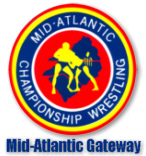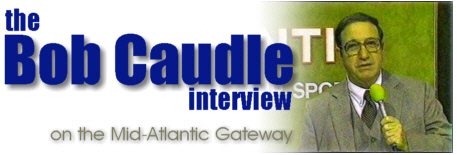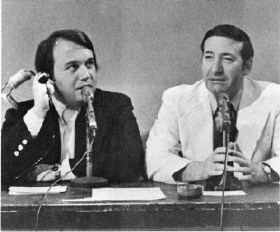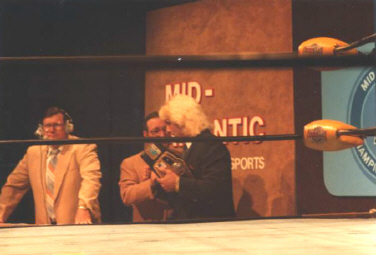|
|
||
|
Special thanks to Gary Causby for his assistance in helping us hook up with Bob Caudle.
|
The Mid-Atlantic
Gateway is extremely happy to present this encompassing conversation
with the voice of Mid-Atlantic Championship Wrestling, Bob Caudle.
Throughout the life span of the Mid-Atlantic Championship Wrestling
promotion, Bob was the lead television announcer on the area’s top
wrestling show, which was widely acclaimed as the best of its kind
during the territorial days of professional wrestling. In this
interview, Bob takes us back in time to his start in the wrestling
business, discusses aspects of the boom period of the 1970s and carries
us through to the national expansion of the promotion through the 1980s.
Taking us behind the scenes of the television product, Bob provides
fascinating insight and memories about Jim Crockett Promotions and the
personalities that made Mid-Atlantic Championship Wrestling so enduring.
Of course, Bob Caudle himself was one of those special personalities.
Thanks Bob, for a wonderful stroll down memory lane! - David Chappell |
|
|
Most of us enjoyed some form of sports on TV or radio as we grew up. I enjoyed college football and basketball, listened to baseball on the radio from all sorts of far off places, and of course there was wrestling.
When I drift back in time, I can still hear the voices that
brought me those great events. It was Harry Carey with the Chicago Cubs,
John Ward on the Tennessee Vol. Network, But
no voice made a more lasting impression on me than the voice of
Mid-Atlantic Wrestling,
-Dick Bourne
"To Bob; Eric Bischoff couldn't carry your coffee cup!"
- Cactus Jack, NWA Wrestling Legends and FanFest in Fayetteville, NC, August 2004. (Click image above.)
|
Chappell: How did you get your start as a professional wrestling announcer? I understand that you worked at WRAL- TV Channel 5 in Raleigh, North Carolina before you started announcing wrestling on television from the studios there. Caudle: Yes, I was doing the weather and the late news at Channel 5 before I did any wrestling there. Chappell: I believe you are originally from Charlotte, North Carolina?
Caudle: That’s right. Chappell: Did you start your television career at WRAL? Caudle: No, the first television job I ever had was in Wilmington, North Carolina. I went from there to Savannah, Georgia. Savannah is a beautiful place. Chappell: Did you get your first taste of professional wrestling in one of those two cities? Caudle: I sure did…in Savannah. That was in the late 1950s. They were trying to get some professional wrestling started down there. An old-time wrestler named Bibber McCoy came down from Massachusetts to sort of get things going. We started doing a show in a little studio there in Savannah. We didn’t have any fans or anything in there, we just did a show. Chappell: How long did that last in Savannah? Caudle: Probably a couple of months or so…not long at all. But that was the first experience I ever had with doing wrestling. Chappell: Did you go from Savannah to WRAL in Raleigh next? Caudle: Yes, I did. Chappell: Tell us about heading up to Raleigh and your start at WRAL. Caudle: Well, I started there doing wrestling in the early 1960s. The wrestling on TV really evolved there over a period of years. Chappell:
Can you give us an overview of how the wrestling production evolved
during your early years with Caudle: Sure.
Initially in Raleigh, what they were doing was taping two shows each
Wednesday. This was when two videotapes were done at the same time. One
show was just shown on [WRAL], and the guy who did the sports on RAL, a
fellow named Nick Pond who has since died, MC’d that show. [ Chappell: And in Richmond, my hometown, that show was called All-Star Wrestling. Caudle: Yes it was. Chappell: Now, in this general time period, weren’t there also other shows being taped by the promotion in other parts of North Carolina? Caudle: Yes. They were also doing a show in High Point. And they were also taping one in Charlotte at a Charlotte station. Chappell: What was the mindset behind doing these tapings from multiple locations? Caudle: Well, I think High Point just showed in High Point and its environs, and Charlotte just showed in Charlotte. I believe the reason it was that way to begin with was because those stations preferred that they had their own sports man doing that show. That’s what I always thought, but I never questioned or asked anybody about that. Chappell: Later, there was a decision at some point to base the television programming exclusively out of Raleigh and WRAL? Caudle: Yes, that’s right. What happened was it was decided somewhere along the way that we were going to change that set up, and not do the one in Charlotte and not do the one in High Point. It was decided that we would just use the show that I was doing in Raleigh that we were sending up to Richmond and Norfolk and some other places. At some point Crockett said, ‘Gosh, why are we spending the money to do these other two tapings when we can just send the tape we’re already doing in Raleigh and already distributing, and send that down there too.’ And that’s exactly what we started doing.
David Crockett and Bob Caudle, WRAL Studios, circa 1975.
Chappell: What was the transition like to the promotion’s television programming only being done in Raleigh? Caudle: I remember they brought the guy in from Charlotte, Big Bill Ward, to work some with me. He didn’t stay very long with me. He was one of many they brought in over the years to pair with me some. Funny thing, I never did see those other two shows. But I believe Charlie Harvell did the one out of High Point, and Bill Ward did the one out of Charlotte. Chappell: Then there would be another change when two completely different shows were taped out of WRAL, and the promotion distributed them both around the territory, right? Caudle: Yes, things changed again when we started doing those two entirely different shows from RAL. My Mid-Atlantic [Championship Wrestling program] ran in a number of different cities. Then they did a second [program], because they could run that in the same cities but it would be a completely different show. Chappell: A lot of fans in the 1970s remember that second show, Wide World Wrestling that later was called World Wide Wrestling. Caudle: What they were going for was to double their publicity, and to add stations as well. But that was sort of the way the whole TV thing evolved. Chappell: You said previously that when you first went to WRAL you were only doing the news and the weather. You were on camera in those jobs? Caudle: Yes. Chappell: Now, when you eventually started doing the wrestling announcing also, how did that mesh with you other duties at WRAL? Caudle: It
was all separate then…and it stayed separate. As I mentioned earlier,
[ Chappell: Was it a significant period of time where you both worked at WRAL and announced wrestling from the WRAL studios? Caudle: Oh yes, I did both together for many years. I stayed at RAL in a non-wrestling capacity through 1980. We would tape our first wrestling show in the studio at RAL on Wednesday evenings at 7:00, and I was through by 8:00 and could then go get the news up or do whatever else had to be done over there. As you
know, in 1981 RAL got out of wrestling and at that point we started
taping in Charlotte at a little television station (WPCQ) down there. That was
really a small place in Charlotte…we didn’t have much room there. We
were there for about two years, and after we left Charlotte that’s
when [
Bob Caudle interviews NWA Champion Ric Flair on the set of Mid-Atlantic Wrestling from WPCQ studios in Charlotte, 1982. Sandy Scott, doing color commentary at the time, waits off camera.
Chappell: You mentioned earlier that from the beginning the promotion was always bringing in others to be your broadcasting partner, a color commentator if you will. Tell us about some of your wrestling broadcasting partners over the years. You worked with Les Thatcher some, I believe? Caudle: Les
worked with me some…for a while. Les was around quite a bit, and he
did a little bit of everything. Les was a nice guy; I liked Les. When I
was doing Smoky Mountain Wrestling for Chappell: I remember you and Johnny working together regularly in the mid 80s, but I know you worked with him occasionally before that. How was Johnny as a broadcaster? Caudle: It took him a while to get into it at first, but later on I think he did all right. Johnny did a good job. When Johnny started announcing with me, he would drive the car and I’d ride with him and some of the other wrestlers. Maybe not
as much as Chappell: He sure could! They both could! (laughs) Caudle: But Johnny did well. There were also some shows that they would just sit a wrestler down with me, to help do some of the commentary. We went through a bunch of those. Gosh…there were a lot of different guys all across the board. Sandy Scott would come out and do some, and then George [Scott] would come out and do some. There was Ed Capral out of Atlanta…he came up but he only worked with me for a while. I don’t know, they always kept trying to find guys that they really liked to do some of this stuff…but they had a hard time really hitting on anybody. As far as the wrestlers, they tried to put guys out with me that they wanted to get a lot of push behind. While they were out there with me, they could get some publicity talking about who they were going to wrestle around the area at that time. And then,
it settled in for the longest time with |




